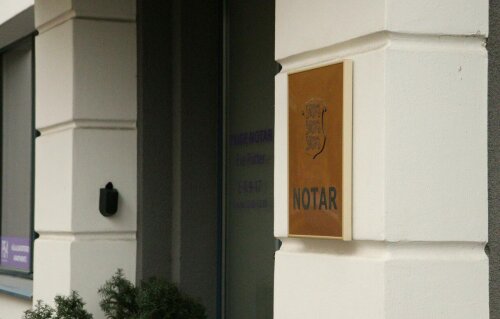Best Landlord & Tenant Lawyers in Paide
Share your needs with us, get contacted by law firms.
Free. Takes 2 min.
Free Guide to Hiring a Real Estate Lawyer
List of the best lawyers in Paide, Estonia
About Landlord & Tenant Law in Paide, Estonia
Landlord and tenant law in Paide, Estonia, governs the legal relationship between property owners (landlords) and individuals or entities who use or occupy these properties (tenants). Whether dealing with residential or commercial leases, these laws regulate issues such as lease agreements, rental payments, deposit handling, property maintenance, dispute resolution, and termination of tenancy. Estonian law aims to ensure fair treatment for both parties, balancing landlords’ property rights with tenants’ rights to secure and habitable housing.
Why You May Need a Lawyer
While many landlord and tenant relationships proceed smoothly, disputes and legal questions can arise. Some common situations in which people may require legal help in Paide include:
- Drafting or reviewing lease agreements to ensure legal compliance
- Dealing with eviction notices or contested terminations of lease
- Handling disputes over unpaid rent or property damage
- Addressing issues related to security deposit returns
- Resolving disagreements about repair responsibilities or housing standards
- Clarifying the rights and obligations when subleasing or transferring leases
- Defending against unlawful eviction or harassment
- Representing parties at the Estonian courts if informal resolution does not succeed
Legal advice can clarify rights, prevent costly mistakes, and resolve disputes efficiently.
Local Laws Overview
The core framework regulating landlord and tenant relations in Paide stems from Estonia’s Law of Obligations Act, which applies nationwide. However, local practices and services in Paide are also important to know.
- Written Lease Contracts: While short-term leases may be concluded orally, written contracts are always recommended for clarity and proof.
- Security Deposits: Deposits are typically limited to three months’ rent and must be held in a secure manner. Upon moving out, landlords must return the deposit minus any justified deductions for damage beyond normal wear and tear.
- Rent Increases: The timing and amount of rent increases are regulated. Proper written notice must be given in advance, and the lease agreement should state how rent can be changed.
- Tenant Protections: Tenants cannot be evicted without cause, and certain procedures must be followed. This includes proper notice and, if necessary, court involvement.
- Repairs and Maintenance: Landlords must ensure the rented property is habitable and safe. Tenants may be responsible for minor repairs due to their own use.
- Ending the Lease: Both fixed-term and open-ended leases have specific rules for termination. Notice periods generally apply unless both parties agree otherwise.
- Local Mediation and Advice: Local authorities and NGOs in Paide can assist with dispute resolution and legal information.
Frequently Asked Questions
Is a written lease agreement mandatory in Paide, Estonia?
A written lease is not always required, but it is strongly recommended for periods longer than one year to protect the rights of both parties.
How much deposit can a landlord demand?
The deposit amount cannot exceed three months’ rent and must be returned after the tenancy, less any deductions for actual damages.
What are the notice periods for ending a lease?
For open-ended leases, at least three months’ notice is usually required unless otherwise agreed. Fixed-term leases generally last until the agreed end date unless terminated for cause.
Can a landlord increase the rent at any time?
No, rent increases must follow the procedure set in the lease agreement. Proper advance written notice must be provided, usually at least 30 days before the new rent takes effect.
What should I do if I receive an eviction notice?
Review the notice for legal compliance and seek legal advice promptly. Tenants cannot be evicted without a valid reason and due process.
Who is responsible for repairs in a rental property?
Landlords are responsible for major repairs and ensuring the property is habitable. Tenants are responsible for minor maintenance arising from normal use.
Can a tenant sublet a rented apartment?
Subletting requires the landlord’s consent unless the lease says otherwise. Unauthorized subletting can be grounds for termination.
How can tenants reclaim their deposit?
After vacating and returning the keys, the deposit should be returned within a reasonable period, after deducting justified expenses for damages. Disputes can be resolved in court or through mediation.
What happens if either party breaches the lease agreement?
The aggrieved party can seek correction, compensation, or termination according to the terms of the lease and applicable Estonian law.
Where can I get support in Paide for landlord and tenant issues?
Local government offices and legal aid services provide advice and help resolve disputes. Consultation with a private attorney is recommended for complex cases.
Additional Resources
- Paide City Government (Paide Linnavalitsus) - Housing and property issues section
- Estonian Ministry of Justice - General legal information
- Estonian Chamber of Bailiffs and Trustees in Bankruptcy - Assistance with enforcement and eviction procedures
- Legal Aid Estonia - Free or low-cost legal support based on eligibility
- Consumer Protection and Technical Regulatory Authority - Assistance with housing standards and tenant complaints
- Local mediation services - Help resolving disputes outside court
Next Steps
If you need legal assistance with a landlord or tenant issue in Paide, start by gathering all relevant documents such as the lease agreement, notices, correspondence, and photos of the property. Make a clear timeline of events and list your main questions or concerns. Contact a local legal aid service or seek a qualified attorney with experience in Estonian property law. You may also reach out to Paide city offices or local mediation services for initial guidance. Taking prompt action and being prepared will help you protect your rights and achieve an efficient resolution.
Lawzana helps you find the best lawyers and law firms in Paide through a curated and pre-screened list of qualified legal professionals. Our platform offers rankings and detailed profiles of attorneys and law firms, allowing you to compare based on practice areas, including Landlord & Tenant, experience, and client feedback.
Each profile includes a description of the firm's areas of practice, client reviews, team members and partners, year of establishment, spoken languages, office locations, contact information, social media presence, and any published articles or resources. Most firms on our platform speak English and are experienced in both local and international legal matters.
Get a quote from top-rated law firms in Paide, Estonia — quickly, securely, and without unnecessary hassle.
Disclaimer:
The information provided on this page is for general informational purposes only and does not constitute legal advice. While we strive to ensure the accuracy and relevance of the content, legal information may change over time, and interpretations of the law can vary. You should always consult with a qualified legal professional for advice specific to your situation.
We disclaim all liability for actions taken or not taken based on the content of this page. If you believe any information is incorrect or outdated, please contact us, and we will review and update it where appropriate.









